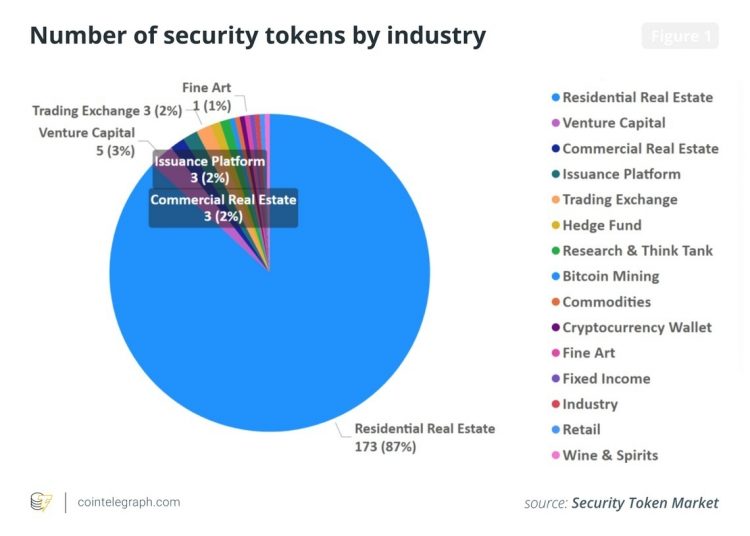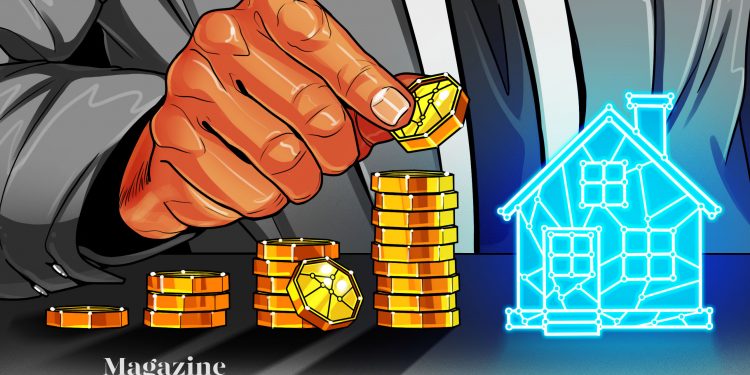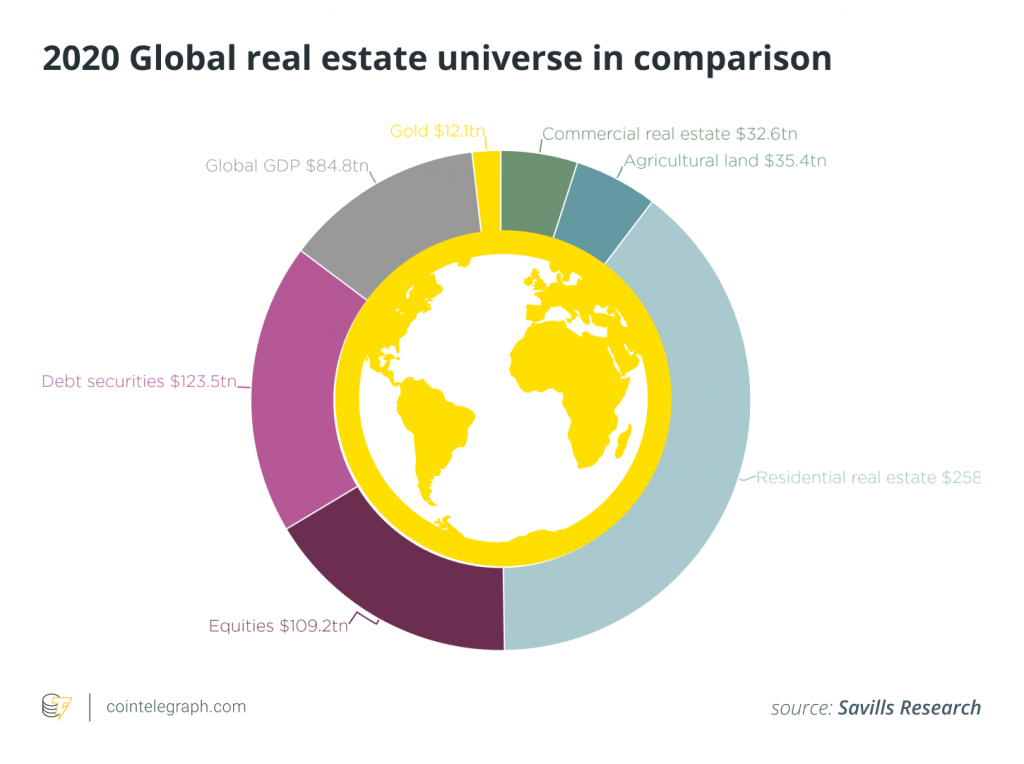Property is the world’s single largest store of wealth, and if the cryptocurrency and blockchain world is seeking an express route to mass adoption, it could do worse than partnering with the real estate industry.
According to a September 2021 report by Savills World Research, the estimated value of all the world’s real estate stands at $326.5 trillion. By comparison, crypto-sector market capitalization was about $1 trillion in mid-July.
The property market, moreover — at least its commercial real estate segment — is also characterized by costly entry barriers and asymmetrical information that favor insiders. Its fees are high, paperwork onerous, and deeds are sometimes defective, falsified or missing. Some properties can take years to move — another way of saying its market is illiquid. All in all, it isn’t surprising that many believe this market is ripe for disruption, particularly through blockchain-enabled tokenization.
This notion of tokenizing real estate isn’t entirely new. As far back as 2019, for example, a 6.5-million-euro villa in Boulogne, outside Paris, was tokenized. One million shares were put up for sale on the Ethereum blockchain, the first property in France ever sold as a blockchain transaction. An individual could have purchased a part of the luxury villa for as little as 6.5 euros.
Will everything be fractionalized?
Last year’s nonfungible token (NFT) breakout — and real properties are nonfungible, i.e., not interchangeable — along with some more supportive regulations, like Regulation Crowdfunding (Reg CF) in the United States, have trained the spotlight more squarely on crypto and property partnerships. This year’s metaverse hype, including Yugo Labs’ record-breaking virtual land auction, has not discouraged activity in the real property world, either.
“Web3 will be all about ownership, owning fractionalized shares,” says Bobby Singh, founder of the NiftySky DAO, speaking at June’s NFT.NYC 2022 convention, which featured an entire track on tokenized real estate. “Imagine fractionalizing the Empire State Building into 2 billion shares.” An individual could own a piece of the Empire State Building for several dollars.

Ownership creates its own momentum, Singh continued. “If you become a collector, an owner, you’re more likely to talk about it.” More owners mean more excitement. “The concept of title is very important.”
“Blockchain has the potential to transform real estate,” Lamont Black, associate professor in DePaul University’s department of finance and real estate, tells Magazine. Real estate is all about records of ownership and how a property is financed, he explains, and “blockchain is ideally suited as a shared system of record-keeping for this type of application.”
Many of these principles are “already being applied to digital real estate in the metaverse,” adds Black, while the ideas behind Web3 — of which the metaverse is one part — “are very much rooted in ownership of digital assets, including basic things like personal data.”
“The efficiency and certainty that comes with tokenization is undeniable,” David Tawil, president and co-founder at ProChain Capital, tells Magazine, and this hasn’t been lost on the real estate industry.
A market that dwarfs the cryptoverse
If one accepts Savills’ numbers, the value of the world’s real estate is more than 300 times the size of the crypto and blockchain sector, which recently slumped below $1 trillion in market capitalization. That disparity hasn’t been lost on observers.
“If even just 0.5% of the total $280 trillion global property market were tokenised in the next five years, it would become a $1.4 trillion market,” wrote Moore Global, a global accountancy, advisory and consulting network in August.
Alternatively, if one uses Savills’ estimate of a $327-trillion market: If just 1% of the global real estate market were tokenized, it would triple the current market cap of the entire cryptocurrency world.
About four-fifths of the world’s real estate is residential, according to Savills. Commercial real estate accounts for only about one-tenth of the total, but that might be where tokenization first makes an impact, some say.
Singh, a veteran of the New York commercial real estate business, explained at the NFT.NYC convention that the legacy commercial real estate market has “a lot of friction” and is burdened by a lack of liquidity. Innovations like blockchain-based NFTs can help with record-keeping because the blockchain is transparent, “and fractionalization will make real estate more liquid.”
“We believe this market will be more open to alternate sources of capital raising, including tokenization,” Navonil Roy, CEO of United Arab Emirates-based LandOrc, tells Magazine. His firm facilitates lending for the real estate industry by providing access to decentralized financing, using land titles in nonfungible token form as a collateral.
Capital formation is often an obstacle in real estate ventures, and tokenization can “open the door for a broader pool of investors,” Sean Stein Smith, assistant professor in the department of economics and business at Lehman College, tells Magazine, “by being able to tokenize and bifurcate the ownership and custody of the underlying physical real estate asset.” It can also enable peer-to-peer secondary transactions so “a robust second market can also be developed.”
The fact that crypto transactions are conducted in real-time offers potential advantages, too, such as “increasing the speed with which mortgages are approved and transactions are completed,” adds Stein Smith.
Obstacles remain
Despite the enormous potential, blockchain technology has made relatively small inroads in the area of property rights so far. The Boulogne villa cited above was more of an exception than a rule.
“Blockchain is a technology that requires coordination among market participants. Until there is more adoption of this technology, the impact will be limited,” Black tells Magazine, adding:
Another hurdle is the role of government. Because real estate title is largely regulated by local governments, the recording of ownership on a blockchain will require government adoption as well. The forward-thinking and nimble municipalities will lead the way.
The “promise” of a globalized, tokenized real estate market with secondary market trading has taken some time “because it required getting multiple licenses,” Max Dilendorf, partner at the Dilendorf Law Firm and who has been working on real estate tokenization projects since 2017, tells Magazine. Securitize LLC led the way, he says, becoming a U.S. Securities and Exchange Commission-registered transfer agent operating on the blockchain about three years ago, but “companies have spent years and years to get licenses in the U.S.” as well as Asia and Europe.
Another obstacle is that so much of the required data to complete a tokenized real estate transaction does not occur natively on the blockchain. It has to be entered manually. University of Basel professor Fabian Schär, for example, wanted to invest a few hundred Swiss francs in a multifamily house in Detroit, as he recounted in a May 2022 Credit Suisse Insights interview:
‘The technical process related to the token functioned seamlessly.’ But then came something that made Schär cancel the transaction: ‘There were around 150 pages of legal documents that I had to read and sign.’
The real estate sector, too, is sometimes resistant to change, which could impede adoption. “Real estate brokers and agents are relatively conservative in their adoption to new technology due to both the monetary sums involved and the implications associated with property ownership rights,” notes Stein Smith.
More success stories may be required, too, before things really get moving. “Real estate owners looking to raise money have a single goal: lower cost of capital,” Yael Tamar, CEO and co-founder of SolidBlock — a real estate tokenization platform — tells Magazine. “Until they are convinced that there is an audience of investors looking specifically for property-backed security tokens, they will not bother with nice-to-have solutions.”
Then, too, the DeFi summer may have inadvertently slowed things down, with DeFi lenders becoming “spoiled” by the unusually high lending returns they enjoyed during this highly liquid period, suggests Roy, adding:
Their expectations of returns in the digital asset world cannot be replicated with real world assets, which are grounded by real world economics. This change in mindset is the most daunting obstacle.
The path ahead could be long, too. When Savills’ Marie Hickey, director of U.K. commercial research, recently wrote about “four trends shaping retail real estate globally,” there was no mention at all of tokenization or blockchain technology. Asked about this, Hickey tells Magazine, “Tokenized real estate is just too insignificant to be cited as a key trend at this point.”
Positive regulatory developments in the U.S.
Still, recent regulation changes in the U.S. could prompt a boom in tokenized projects in Dilendorf’s view. Reg CF, whose fundraising cap was boosted from $1 million to $5 million in late 2020, “will pave the way,” predicts Dilendorf. Reg CF enables a company to fundraise among both accredited and non-accredited investors, and there is no cap on the number of investors who can participate.

Meanwhile, alternative trading systems (ATS) based in the U.S. are building bridges to ATS platforms in Europe and Asia. “So, now if you put your digital real estate token on a platform in the U.S., an investor from Europe or Asia can participate in a secondary market trade,” Dilendorf tells Magazine. This could boost the secondary market substantially.
Transaction fees are low on these blockchain-based ATS platforms like Securitize as well, while smart contracts ensure that transfers are executed between Know Your Customer-verified accounts only. “It’s the creation of a new way to raise capital for small firms,” which is almost like an initial public offering, adds Dilendorf.
NFTs or simple tokenization?
What form might property tokenization take? Are NFTs most promising? Simple tokenization? Or maybe some other forms, such as Soulbound tokens, or SBTs, as proposed recently by Vitalik Buterin?
Tamar says tokenization could assume a variety of forms. “Some will have a part of their cap table on Web3 (for decentralized finance); some will issue NFTs for timeshares and rentals; and others will use tokens for payments or asset management.”
Like, sometimes people send me hitler coins to my public .eth address, and I don't have a way to stop this, but it doesn't really hurt me because etherscan doesn't show them unless you intentionally scroll all the way down the really long list of spam tokens. SBTs are similar.
— vitalik.eth (@VitalikButerin) May 12, 2022
Jarib Figueredo, a candidate for the State House of Representatives in the U.S., who joined Singh on the NFT.NYC 2022 panel on “Understanding the Value of Tokenized Real Estate,” notes that “in Florida, there are issues transferring deeds, and these can be improved with NFTs — digital files that can prove ownership.” Timesharing is another promising use case.
“In the future, real estate title could be issued as a nonfungible token,” Black tells Magazine. “The owner of the property would maintain ownership of the token in a digital wallet. Changes in the value of the property would be reflected as changes in the value of the NFT.” Further:
When the owner wants to sell the property, they could list the property NFT on an NFT exchange. Buyers could bid on the NFT, and the NFT would be transferred to the digital wallet of the winning bidder. This would make the secondary market for real estate much more liquid and transparent.
Dilendorf, for his part, doesn’t see NFTs or DAOs playing a dominant role in the real estate marketplace because they are essentially unregulated, unlike Reg CF-enabled digital securities, which are SEC-sanctioned.
Which kind of real estate projects are most ripe for tokenization? “Landmark assets will be the most successful,” says Tamar, “and top-tier stadiums will fall under this category. Large institutional quality properties will be more likely to get tokenized, as they will experience more liquidity, and they will attract institutions during the primary sale unlike smaller properties.”
Raising up the world’s poor
Blockchain technology, too, can be of use in large swaths of the developing world where the existing infrastructure for ensuring property rights is weak or non-existent, Black tells Magazine, referencing Peruvian economist Hernando de Soto, who has argued that property rights are the key to economic growth. “If blockchain can improve property rights like real estate ownership in developing countries, this could be transformative for entire economies,” says Black.
In an oft-cited Wall Street Journal opinion piece, de Soto emphasized blockchain’s ease-of-access record-keeping that can be continuously updated as property ownership changes. Most of the world’s population has no access at all “to a formal system of property rights,” he wrote, adding:
If Blockchain technology can empower public and private efforts to register property rights on a single computer platform, we can share the blessings of private-property registration with the whole world.
Global disrupter or niche player?
Can the crypto industry reach a point in the future where a significant proportion of real estate will be tokenized — e.g., more than 10% of the global real estate universe — or will this remain a niche area?
“I can imagine that day” — i.e., 10% tokenization — says Tawil, ”but tokenization of real property ownership is likely going to take some time, especially in places like the United States where large infrastructural changes will be required.”
Property deeds are recorded and stored in thousands of municipal offices, after all. These will have to be digitized. Then, too, there exists “a large lobby of professionals that profit from property transactions, which may be marginalized or eliminated in a tokenized property ownership world, such as lawyers, title insurance, brokers, etc.,” Tawil tells Magazine.

According to Black, “Tokenization of 10% of the real estate market is not too difficult to imagine.” Blockchain and NFTs provide a digital record of ownership that can be associated with physical assets, including real estate, autos “and any form of durable good.”
“My prediction is that a large part of the property market will be tokenized to leverage the blockchain economy, but the top 20 percentile — by demand, size, performance, brand, location, etc. — will enjoy 80% of the financing opportunities,” adds Tamar.
As with any disruptive technology, some business sectors could suffer if tokenized property catches on. Title insurance companies could be among the first to feel the pain. “Once there is a clear and transparent ledger that records who owns a property and whether there are any liens on the property, there will no longer be any justification for title company fees,” Black tells Magazine. Still, success often begets success, or as Black puts it:
As societies become more familiar with blockchain as an infrastructure for maintaining digital assets, this could open the door for applying some of these same principles to physical assets like real estate.

Andrew Singer
SBF ordered to jail, Bitcoin ETF delayed and SEC to appeal Ripple case: Hodler’s Digest, Aug. 6-12
Sam Bankman-Fried has bail revoked, ordered to jail; the SEC delays decision on a spot Bitcoin ETF; and the SEC moves to appeal on Ripple’s case.
Read moreSEC seeks appeal over Ripple, crypto prices plunge and EU debuts Bitcoin ETF: Hodler’s Digest, Aug. 13-19
SEC files motion for appeal on Ripple’s case, Bitcoin and Ether prices plunge and Europe welcomes first spot Bitcoin ETF.
Read moreChina mocks US crypto policies, Telegram’s new dark markets: Asia Express




